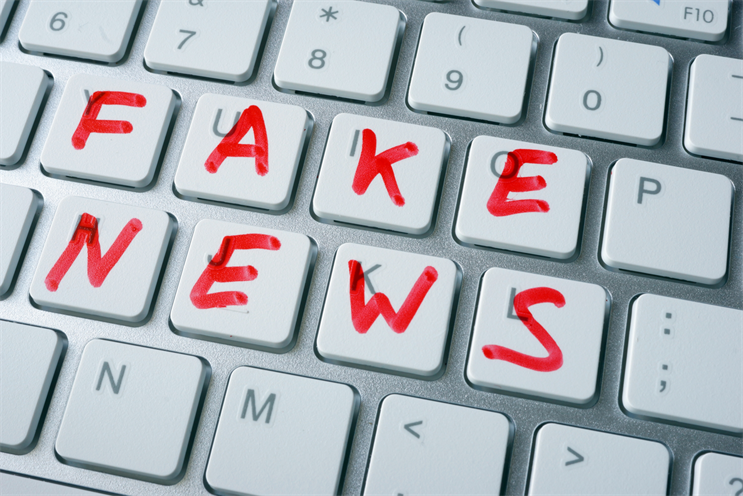Fake news is big news and digital media companies are finally beginning to take notice. Just this week Facebook launched a print ad campaign in The Times, the Guardian and the Daily Telegraph, warning people of ten things to look out for that might alert them to a fake news story.
This follows last month’s launch of Wikitribune by Jimmy Wales, of Wikipedia fame, where professional journalists and volunteer contributors will work together to tackle fake news.
But while observers debate the merits, more decisive action is needed to mitigate the risk to consumers’ confidence in media (and the potential knock-on effect for brands) which now stands at code red.
With elections now imminent across Europe, there is no doubt that deliberate and effective action against fake news has never been more critical.
Last year BuzzFeed analysis found that the top-performing fake news stories generated more clicks than top stories from credible news outlets in the three months before Donald Trump’s shock election as president of the US.
The German government last month decided to pass a law fining social networks up to €50m (£44m) for failure to remove harmful fake or defamatory content.
The 20 top performing fake news stories generated a huge 8,711,000 shares, reactions and comments. The top 20 genuine news stories generated 7,367,000. Fake news is therefore big business for its proponents.
In response to growing concern that online hoaxes could influence the German federal elections later this year, the German government last month decided to pass a law fining social networks up to €50m (£44m) for failure to remove harmful fake or defamatory content.
This means malicious material and disinformation is deleted within a week and illegal posts, such as those featuring racist language, will have to be removed within 24 hours.
Germany’s position is far more forceful than any yet taken in the UK. In contrast, the response of the UK’s government has been relatively muted with MPs announcing an enquiry into how fake news can be combated including a warning from Damian Collins, chair of the culture, media and sport select committee, that Facebook must improve its response and block or issue warnings.
While this new press campaign might be enough to get the government off its back it feels like a tiny contribution to a problem that feels like it needs far, far more than just a "well, we did warn you" approach from Facebook.
Wikitribune’s attempt to combat fake news, on the other hand, relies on professional journalists and volunteers to provide "factual and neutral" articles that are verified and contain references to their source.
Instead of relying on advertising revenue (which, critics say, is the source of so much clickbait that helps to fuel the fake news phenomenon) Wikitribune will depend on donations, much like Wikipedia itself.
Research in Germany ahead of the unveiling of its fake news clampdown proposals showed Facebook removes just 39 per cent of flagged content, while Twitter deletes just one per cent.
The trouble is, much of what is being done feels a bit too much like trying to close the stable door after the horse has bolted. Brands and organisations (including the UK government and the Guardian) pulled their advertising from Google and YouTube after The Times revealed in March they were being inadvertently placed next to extremist content.
Subsequently, Google sought to reassure advertisers and promised to take action. Even so, many still feel cautious as hateful propaganda and deliberate hoaxes all over the search engine remain rife.
Indeed, research in Germany ahead of the unveiling of its fake news clampdown proposals showed Facebook removes just 39 per cent of flagged content, while Twitter deletes just one per cent.
Recently, Paul Chichester, the director of operations for the UK government’s new National Cyber Security Centre – a body controlled by GCHQ – called on the likes of Twitter and Facebook to recognise their "social responsibility" to help tackle misinformation.
He is right. But that’s not the solution, it’s just the starting point.
As it becomes evident that we can’t rely on the likes of Google and Facebook to provide authenticity and transparency themselves when there are clicks to be had and money to be made, Wikitribune deserves our (caveated) support. Others should also be stepping forward to take real action in the fight against fake news in our post-truth world. And real action means more than just words.
As an industry, advertising stands to lose out big time from any fall in consumer confidence in media as a result of fake news. And, by the same measure, it has powerful potential role to play in supporting credible and trusted news and media organisations waging war on fakery.
I'm talking about actively supporting those news and media organisations (new or old) that seek to diminish fake news and misinformation.
I’m talking about demanding data concerning the whereabouts of ads rather than simply turning a blind eye so long as reach and frequency numbers are hit.
And I’m talking about calling for the UK to actively follow the lead of Germany by introducing proper policing of what is pumped out by sites – policy that includes heavily fining those who refuse to take effective and decisive action on deliberately false or dangerous stories or posts online.
Peter Zillig is the chief executive officer of Cheil London.


